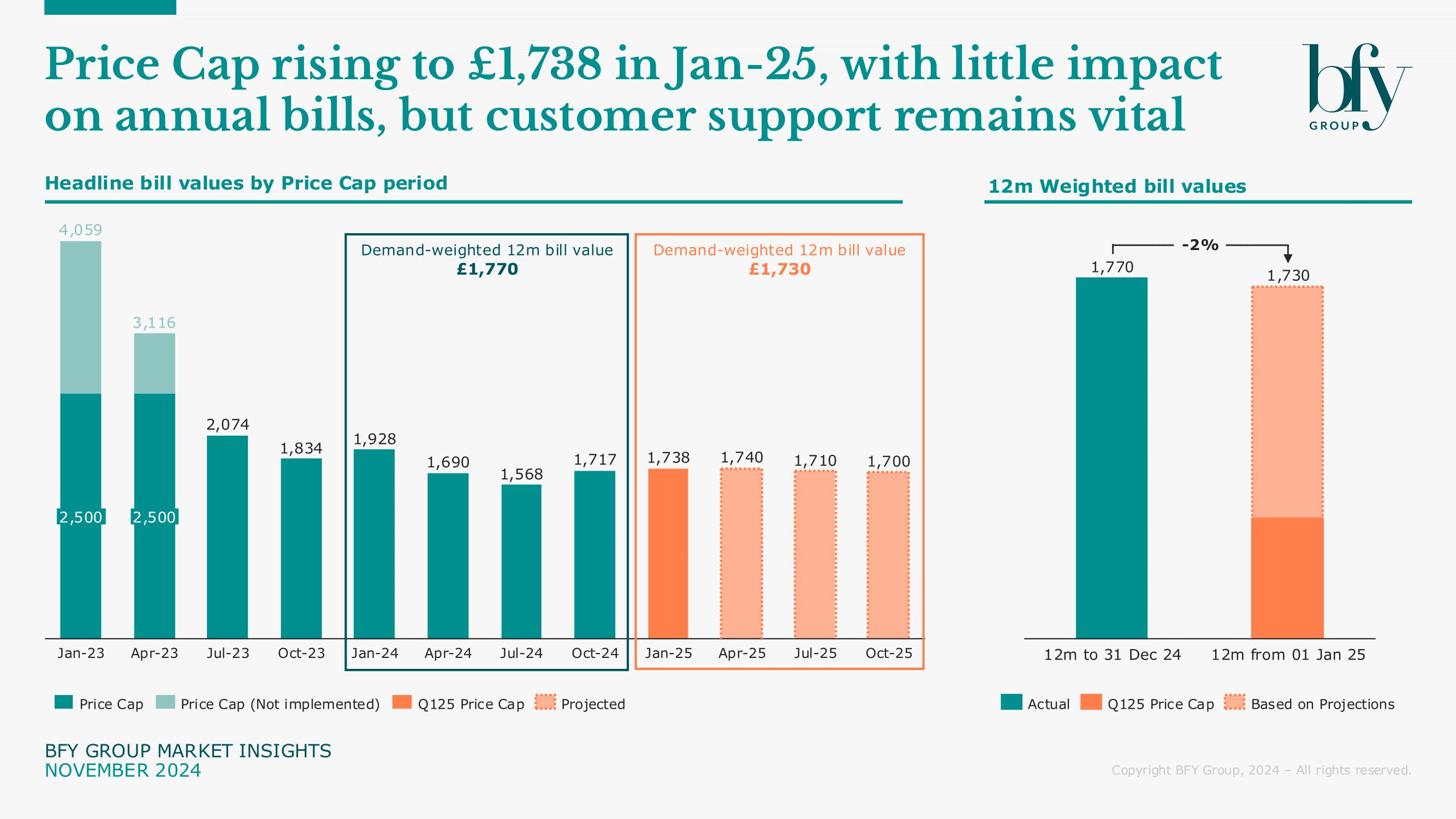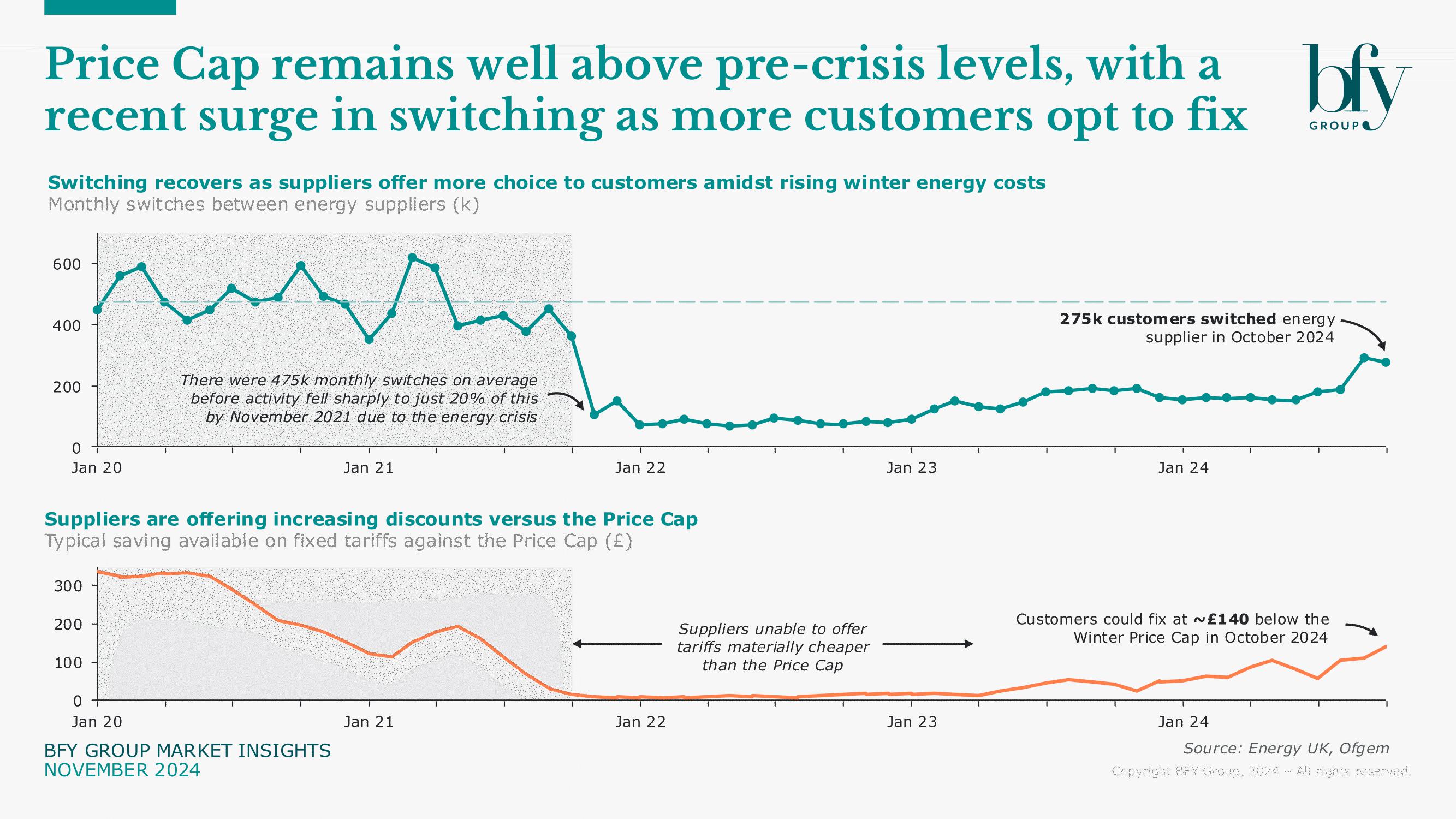Ofgem have today (22 Nov) announced a £21 (1%) increase in the energy Price Cap, rising to £1,738 from January 2025.
This increase won’t significantly impact bills, but affordability challenges continue, as Ofgem and the government consider options to address the underlying issues.
Key points:
- Price Cap creeps up to £1,738, but this will have little impact on customer bills over 12 months
- Customer switching has started to return with ~280k customers switching per month since September, but this is far below previous levels
- Fuel poverty remains a major concern, with bills 70% higher than pre-crisis and an estimated fuel poverty gap of £6bn
- Ofgem and the government are considering options to address affordability challenges - but the impact won’t be felt this winter, and immediate support remains a top priority
Price Cap creeps up, but will have little impact on customer bills
Ofgem have announced the energy Price Cap will be set at £1,738 for January 2025 – a 1% increase of £21 from October 2024’s figure. This represents a £190 drop compared to the same time last year, but is higher than the prices paid earlier this summer.
For typical customers, the latest Price Cap increase will have a minimal impact on bills over 12 months. Based on our projections, and adjusting for seasonal consumption, customers could expect to pay around £1,730 over the 12 months starting from January 1st 2025, which is £40 less than in the previous 12 months. The pre-energy crisis bill levels we often refer to are becoming a distant memory, as current market prices suggest the Price Cap will stay above £1,700 throughout 2025, meaning affordability challenges will continue for too many households.
You can estimate the impact of the latest Price Cap increase on your Direct Debit levels, by using our Price Cap Calculator.


Customer switching has increased, but it’s still far from pre-crisis levels
Switching activity has seen a notable uplift since September, with ~280k domestic customers switching per month. This is driven by customers locking in cheaper fixed tariffs before the Price Cap increase, with annual savings of up to £140 available against the cap.
However, switching levels are still far below pre-crisis numbers, where we saw ~475k switches per month before 2021. That said, with suppliers still offering discounts of up to £100 per year, switching could continue to grow in the coming months.
We’ve recently highlighted how dynamic time-of-use tariffs can help engaged customers lower their bills. Over the past 12 months, typical customers were able to save £150 on a dynamic tariff, and whilst achieving similar savings in 2025 will require a shift in consumption, this demonstrates the potential for proactive customers to benefit.
Despite these opportunities, affordability remains a significant issue for many households. Suppliers have already taken steps to assist vulnerable customers, including setting up support funds, but this must remain a top priority throughout winter. Delivering tailored and proactive support will be essential to help those most in need.

Affordability remains a major concern, with bills 70% higher than pre-crisis, and up to a quarter of households in fuel poverty
The cost-of-living crisis hasn’t gone away, and fuel poverty continues to be a major concern.
Bills are 70% higher than before the energy crisis, and we estimate up to 7m households (25%) are spending 10% or more of their disposable income on energy - with a total fuel poverty gap of £6bn.
This situation is compounded by growing debt, which reached a record £3.7bn as of Q2-24, and will likely worsen until affordability challenges are resolved and fuel poverty is reduced.
It’s crucial that suppliers continue to take proactive steps to support vulnerable customers this winter (e.g. through support funds), especially given the impact of Winter Fuel Payment restrictions, which will heighten the pressure on those already struggling that have fallen out of scope.
Comprehensive aid and cross-sector collaboration are needed to identify those in need, while investment in digital platforms will help customers manage payments and debt efficiently. Stronger customer service teams are also essential for addressing complex cases, and suppliers must continue to engage customers through longer collection cycles and diverse communication channels, to ensure they stay informed and supported.
Long term changes considered by Ofgem and the government, but immediate support remains a top priority
Both Ofgem and the government are taking steps to address fuel poverty, but the impact won’t be felt this winter.
This week, the government released its Winter Homes Plan, aiming to bring an estimated 1m homes out of fuel poverty by 2030, by increasing the minimum energy efficiency standards for rented homes. Other plans announced include increasing minimum efficiency of new boilers and heat pumps, while overseeing £3.2bn of investment to help lower bills. It’s welcome news, potentially providing lasting benefits for many households and supporting Net Zero.
Ofgem are considering options on issues that many believe contribute to affordability challenges. These include reviewing standing charges, and looking at how to reallocate these costs to higher energy consumers; as well as encouraging suppliers to offer innovative tariffs that could benefit lower consumers. However, Ofgem are also considering a potential reform of the Price Cap through a review of operating costs, which could ultimately lead to an increase in the cap over time.
Whilst these efforts are important, they won't offer short term relief to customers facing immediate pressure.
There are no easy, or cheap options – but without properly acknowledging and addressing fuel poverty it will be impossible to make the transition to Net Zero - which needs to be accessible and affordable for all.
Ian Barker, Managing Partner at BFY Group, said:
“The latest increase in Ofgem’s Price Cap to £1,738 reflects stabilising wholesale prices, but it doesn’t ease the strain for households grappling with energy bills that are 70% higher than pre-crisis levels.
“With record-high levels of domestic debt, affordability continues to be a major concern.
"While it’s encouraging to see more customers saving by switching to fixed tariffs and exploring innovative options like time-of-use deals, the industry must continue to prioritise targeted, proactive support for vulnerable households this winter.”
For more on the implications of January’s Price Cap increase, and how you can effectively support vulnerable customers this winter, contact Matt Turner.
Matt Turner-Tait
Senior Manager
Matt lead clients through key strategic projects exploring growth opportunities, business models, competitive advantage, and mergers & acquisitions.
View Profile

